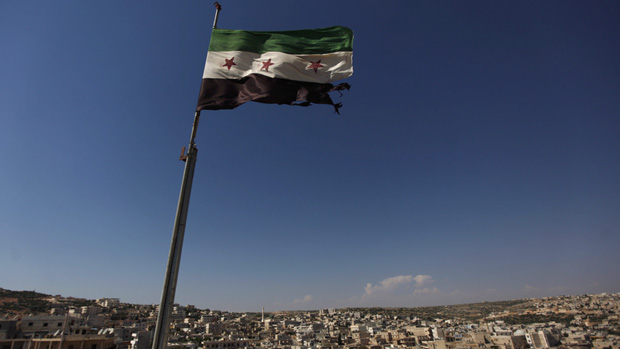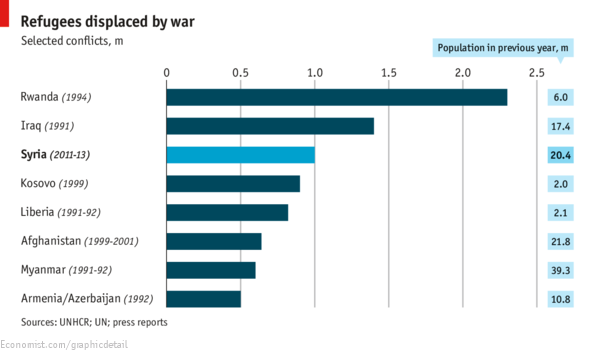
A Syrian revolutionary flag flies above buildings on the outskirts of Aleppo. (Khalil Hamra/Associated Press)
With nearly 70,000 dead Syrians since the beginning of the unrest, the Syrian conflict certainly join a select group of international massacres. At this path Samathan Power will have enough facts and material in order to write volume two of “A problem from Hell” looking at the ghosts of Syria. What are the options for the West – U.S. and Western Europe – in dealing with Syria?
The Syrian conflict is taking place at a turning point in Western liberal order. On the one hand, the 2007 financial crisis has forced Western powers to not only do some “state-building at home” — see the latest Haas’ book — but as well cut defense expenditures. Most European powers are now spending less than the two percent required of their GDP, a red line laid out by NATO, on defense expenditures. The second considerable aspect is the strategic shift of the U.S. towards Asia. The “pivot” announced by President Obama comports several requirements: European powers must invest more in defense and take care of the near and far neighborhoods; the U.S. will became less present in the middle East.
In recent days, the U.S. has become more vocal about Syria. Heavyweight Republican politicians, like Senators McCain and Graham, have been advocating for military intervention through the air without sending boots on the ground. Their strategy is based on the same medicine for all crisis: no-fly zone and arming rebels. Senator Graham argued that “One way you can stop the Syrian air force from flying is to bomb the Syrian air bases with cruise missiles.” With the recent allegations that the Syrian governments may have used chemical weapons, seen as a red line by the Obama administration, the U.S. and European powers have to make a decision. Obama repeated at several occasion that the use of chemical weapons would be like crossing the Rubicon. With the used of chemical weapons, the U.S. is now confronting a real dilemma: a continuous non-intervention could have direct impact on U.S. credibility as a global power. So far other world powers, especially the BRICS, have remained silent on the matter.
Interestingly the U.S. has been talking of intervention – unknown of its types – due to the allegations of the use of chemical weapons. But what would the legitimacy of such intervention be? Will the U.S. and European powers, through NATO, go to war like in 1999 in Kosovo? Kosovo was ethically right but legally a wrong mission. Right because of the violence perpetuated against minority groups and civilians, and legally wrong as the West did not have a U.N. Security Council Resolution (UNSCR) allowing the use of force in Kosovo. So are the U.S. policymakers ready to make the same choice? The only difference is that in 1999 the history had ended, and the U.S. was the undisputed hegemon. Fifteen years later the world is becoming increasingly multipolar considering the rise of new powers — China, India, Brazil — objecting to the use of force for political and ideological reasons.
Is the only way out through the use of the United Nations? Unfortunately, the 2011 operation in Libya was the dagger piercing the heart of the U.N. Russia and China felt cheated by France, the U.K. and the U.S. over the use of UNSCR 1973 allowing the implementation of a no-fly zone. The outcomes of the NATO mission led by Paris and London brought down the Qaddafi regime. Moscow and Beijing condemned such outcomes, claiming that regime change was not on the menu of the agreed resolution. Since Libya, the U.N. Security Council has lost some of it relevance and most of its teeth, and Syria should be the critical juncture revitalizing it. The three Western permanent members need to push the agenda in New York by reaching out to the two other P-5 members.
However, there is an important limit to this strategy: What is the endgame in Syria? How can the five interests merge into one UNSCR? Moscow and Beijing do not want to see Al-Assad being ousted, while Paris, London, and DC would not mind. Would arming the rebels be an acceptable options after what went done in Libya? The Syrian conflict ranks as maybe not the deadliest conflict, but as one causing one of the greatest humanitarian crisis as demonstrated by the figure below produced by the Economist:

Ultimately, two options may emerge from this international limbo. The first one, let’s just accept the massacre as the world did in Rwanda. Then scholars and politicians can ask the same questions: what went wrong? and what can we do in order to avoid such type of violence? The second one is the West get dragged down in Syria due to a game of alliances. The latest Israeli airstrikes on May 4 could be the ignition to a wider spread of violence requiring Western intervention.